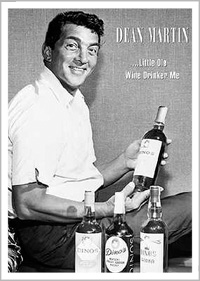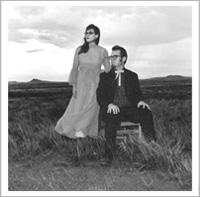By Don Jacobson
In this edition:
Little Ole Wine Drinker Me / Dean Martin
The Woman Downstairs / Handsome Family
Even though Dean Martin never lived here, he and Chicago really go together. It probably comes from the fact that Dino spent so many nights here in the ’50s and ’60s playing gigs in mob-owned nightclubs, ostensibly paying back his early-career gambling debts.
 The highlight of that particular string of efforts came, critics agree, during a spectacular weeklong gig with fellow Rat Packers Frank Sinatra and Sammy Davis Jr. at the Villa Venice Supper Club in Wheeling in November 1962. The Villa was owned by Sam “Momo” Giancana, to whom not only the various Rat Packers but even the then-president of the United States were indebted. The story of the Villa was recounted last year by Robert McCoppin of the Daily Herald:
The highlight of that particular string of efforts came, critics agree, during a spectacular weeklong gig with fellow Rat Packers Frank Sinatra and Sammy Davis Jr. at the Villa Venice Supper Club in Wheeling in November 1962. The Villa was owned by Sam “Momo” Giancana, to whom not only the various Rat Packers but even the then-president of the United States were indebted. The story of the Villa was recounted last year by Robert McCoppin of the Daily Herald:
“Located where Allgauer’s Restaurant now sits, near the Des Plaines River, the Villa Venice had a boat landing with Venetian lanterns on the banks, where patrons could ride in a gondola. For an out-of-the-way club, the Villa Venice somehow got top-flight talent, including Sinatra, Davis and Martin, and then-popular singer Eddie Fisher.
“Sinatra’s daughter Tina wrote in her book that to repay Giancana for help getting the union vote for John F. Kennedy in 1960, her father brought the Rat Pack to do several shows at the Villa Venice. In 1967, the theater and restaurant burned down in a mysterious fire.
“Bill Hein, a member of the Wheeling Historical Society, was at the Rat Pack show. He said the club was gorgeous, with satin ceilings and tapestries, and the show was fabulous. Hein, a former volunteer firefighter in Wheeling, was also there the night Villa Venice burned down.
“‘I’ve never seen anything go up so quick in my life,’ he said.
“In the years Villa Venice was open, according to Crimemagazine.com, the FBI estimated the supper club and gambling at a nearby Quonset hut grossed over $3 million.”
With all of these rich Chicago connections, it was probably inevitable that Dino would do a song that referenced the city in its lyrics, and he did in 1967 with a version of “Little Ole Wine Drinker Me,” a song written by country-western scribe Hank Mills along with Dick Jennings. It was a Top-40 hit for Dino, who was then in the midst of his Reprise Records phase and whose NBC-TV variety show was at its height of popularity. He was also appearing in the movies in the guise of James Bond rip-off Matt Helm.
The song played off of Martin’s image as a boozer, of course. And like a lot of Jimmy Bowen-produced ’60s stuff, “Wine Drinker” has that soft country-pop sound that Martin helped to pioneer. Lyrically, it falls into that category of songs that use Chicago as a metaphor for someplace you can go to to escape love trouble back home and start over, usually with the help of an always-available job. In music, as in life, the main reason people seem to come here is to make money.
In the song, the singer has relocated here from Nashville, which cements the Chicago-country music connection, but instead of working he spends most of his time drinking:
I’m praying for rain in California
So the grapes can grow and they can make more wine
And I’m sitting in a honky in Chicago
With a broken heart and a woman on my mind
I matched the man behind the bar for the jukebox
And the music takes me back to Tennessee
And he asked who’s the fool in the corner crying
I say a little ole wine drinker me
I think the biggest difference between Chicago and Nashville is that down there they mostly drink beer and Jack Daniels to forget. But is it really any easier to escape the past on Clark Street than it is back in the smallville you came from?
I came here last week from down in Nashville
‘Cause my baby left for Florida on a train
I thought I’d get a job and just forget her
But in Chicago, the broken heartache’s still the same
Dino’s ultrasmooth delivery could really put over the country heartache, which is not something he gets much credit for thanks to his years of hanging with Momo and the Chairman of the Board out in Wheeling.
Also, in an interesting note, “Little Ole Wine Drinker Me” also charted for movie star Robert Mitchum in the same year. It had to be one of the few times you could buy dueling versions of movie stars singing the same country song.
The Woman Downstairs / Handsome Family
For my money, this is the strangest as well as the coolest song ever written about Chicago. And from my perspective as a one-time, near-penniless haunter of North Ashland Avenue, probably the most accurate. Rennie Sparks, kudos to you – with this song you have totally captured the feeling of what it’s like to sink into the emotional and spiritual abyss that is Chicago.
 In fact, I put it to you that “The Woman Downstairs,” from the Handsome Family’s 1998 album Through the Trees, captures in musical form the modern-day equivalent of Nelson Algren. With Brett Sparks’ spooky deep voice singing Rennie’s depressing yet oh-so-true words depicting the mournful reality of the poverty lurking just beneath the veneer of Wicker Park yuppie-dom, I can vividly recall that unsettling sensation of living in a neighborhood that is at once glamorous and riddled with decay.
In fact, I put it to you that “The Woman Downstairs,” from the Handsome Family’s 1998 album Through the Trees, captures in musical form the modern-day equivalent of Nelson Algren. With Brett Sparks’ spooky deep voice singing Rennie’s depressing yet oh-so-true words depicting the mournful reality of the poverty lurking just beneath the veneer of Wicker Park yuppie-dom, I can vividly recall that unsettling sensation of living in a neighborhood that is at once glamorous and riddled with decay.
Chicago is where the woman downstairs
Starved herself to death last summer
Her boyfriend Ted ate hot dogs and wept
With the gray rats out on the fire escape
In a thrift store chair I drank cases of beer
And dreamed of laying down on the El tracks
The trains roared by under smoke-gray skies
Lake Michigan rose and fell like a bird
And when the wind screamed up Ashland Avenue
The corner bars were full by noon
And the old stewbums sliding down their stools
Ate boiled eggs and fed beer to the dogs
This song just gets it so right. The wind does indeed scream up Ashland Avenue. That’s what you find out if you ever have to stand out there waiting for a bus in January. If it doesn’t come, you have the option of ducking into one of the bars, which on weekend nights seem so charming because they’re authentic dives. But if you actually live near Ashland Avenue (rather than fleeing back to Schaumberg after closing time) you know that if you go into these places at noon on a weekday it’s a different story. That’s when you can rub shoulders with your real neighbors: starving little old ladies and “stewbums.”
The woman downstairs lost all her hair
And wore a beret in the laundryroom
I borrowed her soap and bought her a Coke
But she left it on a dryer
She died in June weighing 82
Her boyfriend went back to New York
The cops wandered through her dusty rooms
One of them stole her TV
Tell me, how many songs can so effortlessly evoke the heartlessness of Chicago with so few well-chosen words? It’s basically a just a cold, windy, mean place full of losers and slowly dying alcoholics. And that’s just why I love it.
*
Visit the Chicago In Song archive.
Posted on November 16, 2006


